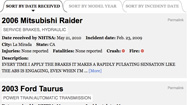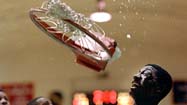Teacher responses to the 2010 release
The following is a list of teacher responses to their "value-added" ratings during the intial release in 2010. See the most recent responses »
The Times gave LAUSD elementary school teachers rated in this database the opportunity to preview their value-added evaluations and publicly respond. Some issues raised by teachers may be addressed in the FAQ. Teachers who have not commented may do so by contacting The Times.
|
|
 Delicious
Delicious
|
 Digg
Digg
|
 Facebook
Facebook
|
 Twitter
Twitter
|





This is very unproductive to be releasing this information, which is outdated and irrelevant. These scores are based on my first four years of teaching. My first year I was, without time to prep, placed in a 2nd grade classroom to substitute for a teacher during her maternity leave. I ended up teaching this class for the entire year. I was still working on my credential and had not even student taught yet. The following year I was placed in a 3rd grade classroom.
The year after that, I was placed back into a 2nd grade classroom then halfway through the year my class was disbanded and I was sent to take over the 3rd grade class of a teacher who had been displaced. At the time I began, that class had already been through 3 other substitute teachers. That same year, I was displaced, due to a dwindling student population and placed in a new school in a 4th grade classroom. It is completely unfair to base my performance on test scores when my influence on those test scores during one of those years was, at best, partial.
For the last four years I have been teaching Kindergarten, for which you have no scores because students at the Kindergarten level are not tested. Prior to teaching Kindergarten, I had been bounced around from grade to grade; before I was finished with my credential, without ever going through a student teaching program with a mentor teacher, and without ever having the chance to stay in one grade level long enough to really learn the curriculum and improve myself in that same grade level. In spite of all this I taught to the very best of my ability. I am now going on my 5th year of teaching Kinder and feel that I have grown tremendously and know the curriculum well enough to say that I am a great teacher!. I am a teacher who loves what she does and loves to watch her students grow and learn. And, I know they love their teacher.
Angela College
Kindergarten Teacher
Arminta Street Elementary
August 17, 2010 at 6:19 p.m.
To use 1 test to judge teachers is flat wrong. I have a Bclad credential and class and usually split up by ELL level. Every year I was given classes with the lowest ELL levels. Historically speaking, 2nd grade scores are usually high and dip in 3rd grade. 3rd is where students are required to go from concrete thinking pattern to more abstract and critical thinking pattern that many times require more than 180 to master. The scores then go up in 4th grade after students have time to ajdust to new expectations in thinking, as they gain more english.
August 17, 2010 at 5:51 p.m.
I work in a team-teaching situation where I teach science and social studies to two rooms of fifth grade students. My partner teaches math to both rooms while I teach social studies and science. We each teach reading/lang. arts to our own classrooms. I find it interesting that for the past several years ,60% of my students have scored proficient or above in language arts, and their science CST scores have been several points above the state average - 60% or more scoring proficient or above. I find it hard to view myself as an ineffective teacher.
August 17, 2010 at 5:35 p.m.
My goal as a 5th grade teacher is to foster a love of learning in my students. I do this by providing them with meaningful, challenging assignments, preparing them for middle school, and recognizing the "whole" child--giving them opportunities for them to practice kinesthetic, visual, auditory, and physical skills. I follow the California Education Standards in all disciplines for my grade level, as well as the local district ones. In doing this I maintain a successful, positive classroom. My students and I work hard everyday, but never has my goal been to teach to a test.
I work at a high performing school. Many of my students enter my classroom with scores already at the proficient and advanced level. It is not uncommon for some to have perfect scores of 600. Should these students maintain these scores, I would be considered an average teacher because the student did not improve. If a student misses even one or two questions (dropping to 580 or 560), I would be considered to be doing a poor job. This seems unreasonable. Does it matter that the curriculum becomes progressively more difficult as the student proceeds through the grade levels? Does it matter if a grade level departmentalizes and groups students for various subjects among three or four other teachers? Does it matter that a student's previous scores could have been the result of overzealous preparation on a former teacher or tutor's part? Does any of this contribute to the overall well being of the child?
I welcome the notion of meaningful evaluation for teachers and other educators. Reform certainly is in order, but this notion is flawed--it gives too much weight to test scores with little regard to other factors. Analyzing this data grade level by grade level and school wide is beneficial, especially in terms of maintaining grading uniformity within a grade level or cohesiveness from one to another. It would promote collaboration among colleagues. But rating individual teachers in this manner seems petty and of little consequence. Teachers work hard to improve instruction with very little funding for professional development provided by our district. This article serves only to discourage teachers who are already facing larger class sizes and diminishing professional growth opportunities. It will, however encourage the frustrated among us to begin teaching to the test, pit teachers against one another, and cause parents to judge teachers based only on their test scores. Is this what we want for our students?
August 17, 2010 at 4:49 p.m.
I have problem with an over-reliance on the sole use of value-added methodology – a controversial, much disputed and largely unproven means to evaluate teachers. One of my strengths, for instance, is in the area of writing, and it is not being tested. The CST student tests are limited and do not encompass the wholistic approach I have to teaching. We are concerned that like so many others, the Times is satisfied
with painting our teachers, our schools and our public education system with a broad brush without taking any time to fill in the colors. It’s an approach that does a disservice to our students, their parents, our teachers and our community. We already use these tests to discover weaknesses and create programs to strengthen these areas, but we are already teaching too much to the tests and are in danger of creating a whole generation of students that cannot think or reason, and thus, will not be prepared to compete in the work place, or even simply just learn how to live a good life.
An educational system isn't worth a great deal if it teaches young people how to make a living but doesn't teach them how to make a life. ~Author Unknown
August 17, 2010 at 4:44 p.m.
The state provides scale scores to show the proficiency of each student tested, and our district provides a report that shows this data across three years. These scale scores are calculated by the state so that proficiency is rated equally across grade levels and the changing standards being taught. My students have typically made almost equivalent progress in both math and language arts. While my students in math achieve proficiency at a higher level than in language arts, they are making progress at about the same rate in both subjects. The difference is that my students are predominantly English Language Learners. So despite having made gains in their acquisition of these language arts skills, that work is seen as less effective than the work we did in math. In many cases, my students out-performed the district scores in language arts. Some of them gained proficiency in language arts, while many of them are closer to that goal. Is that ineffective?
August 17, 2010 at 4:21 p.m.
I am very surprised by my results and remain dedicated to my profession. I want the best for my students and work very hard on their behalf. I don’t know that linking teacher evaluation to only one factor (standardized testing) is the best way to go about judging a teacher’s effectiveness. It would be like issuing student report cards based on one test.
August 17, 2010 at 4:18 p.m.
LAUSD's policy in regards to letting go of teachers has been based only on senority. Maybe now they will look at this data and change their ways!
August 17, 2010 at 3:51 p.m.
I have never taught a 2nd/3rd grade split as is indicated above. In fact, I have not taught 2nd grade at all for nearly fifteen years. Based on that inaccuracy, if nothing else, I must question the validity of these ratings.
August 17, 2010 at 3:48 p.m.
No comment at this time.
August 17, 2010 at 1:42 p.m.